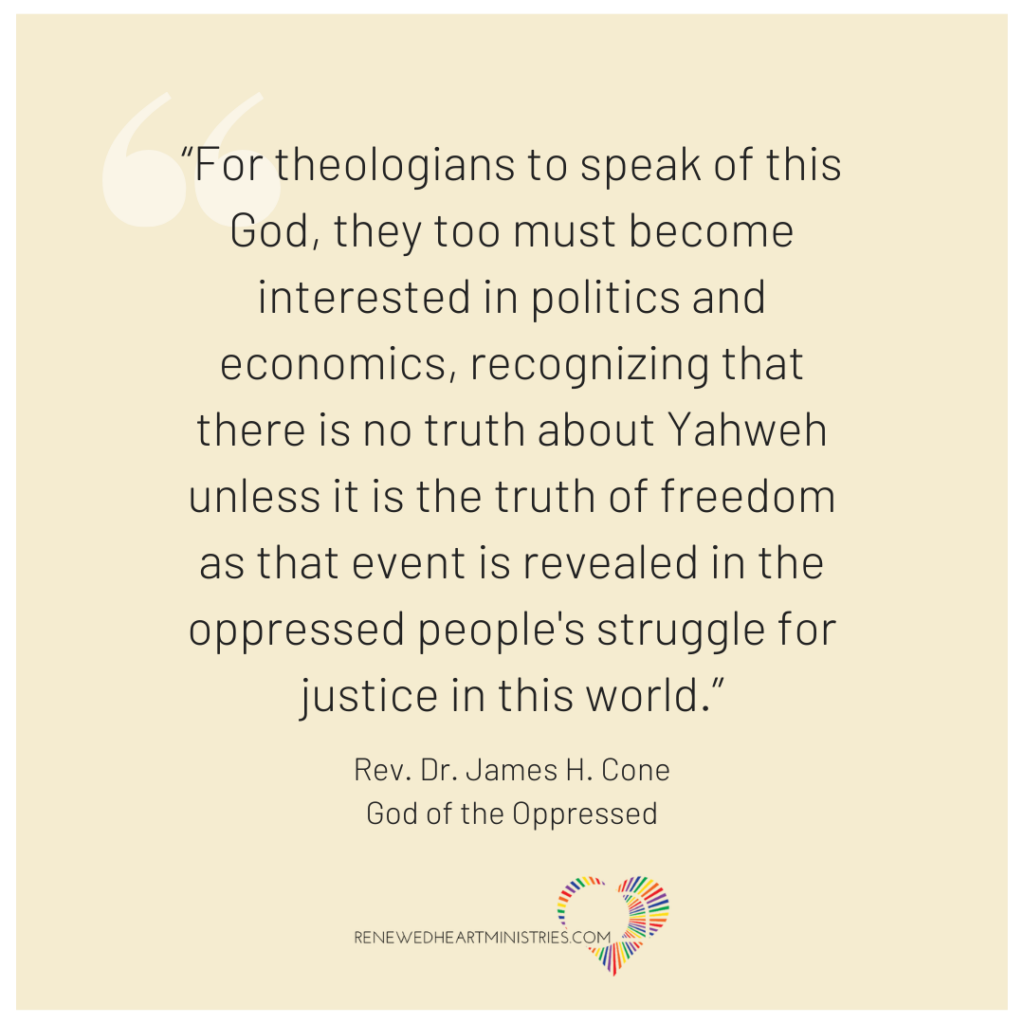Renewed Heart Ministries is a nonprofit organization working for a world of love and justice.
We need your support to offer the kind of resources RHM provides.
Helping people find the intersection between their faith, compassion, and justice is work that continues to prove deeply needed.
Please consider making a donation to support Renewed Heart Ministries’ work, today.
You can donate online by clicking here.
Or you can make a donation by mail at:
Renewed Heart Ministries
PO Box 1211
Lewisburg, WV 24901
And to those of you out there who already are supporting this ministry, we want to say thank you. We could not continue being a voice for change without you.
Herb Montgomery | July 30, 2021
“The focus of anioios was primarily about the quality of the age to come and only secondarily about the age’s duration. In the eternal age or the eternal life, injustice, oppression and violence would be put right. In this context, an alternative, life-giving interpretation of Jesus’ words in John’s gospel is a call to focus on the long game of establishing justice in the earth over the temporary gains of power, privilege or property.”
Our reading this week is from the gospel of John.
‘Once the crowd realized that neither Jesus nor his disciples were there, they got into the boats and went to Capernaum in search of Jesus. When they found him on the other side of the lake, they asked him, “Rabbi, when did you get here?” Jesus answered, “Very truly I tell you, you are looking for me, not because you saw the signs I performed but because you ate the loaves and had your fill. Do not work for food that spoils, but for food that endures to eternal life, which the Son of Man will give you. For on him God the Father has placed his seal of approval.” Then they asked him, “What must we do to do the works God requires?” Jesus answered, “The work of God is this: to believe in the one he has sent.” So they asked him, “What sign then will you give that we may see it and believe you? What will you do? Our ancestors ate the manna in the wilderness; as it is written: ‘He gave them bread from heaven to eat.’” Jesus said to them, “Very truly I tell you, it is not Moses who has given you the bread from heaven, but it is my Father who gives you the true bread from heaven. For the bread of God is the bread that comes down from heaven and gives life to the world.” “Sir,” they said, “always give us this bread.” Then Jesus declared, “I am the bread of life. Whoever comes to me will never go hungry, and whoever believes in me will never be thirsty.’ (John 6:24-35)
I grew up understanding this passage as encouraging focus on getting to heaven in the afterlife, and not focusing on earthly realities that impact our lives in the here and now. An earthward focus was considered a waste of time, “arranging deck-chairs on the Titanic.” This school of interpretive thought has born deeply destructive fruit and has always been coopted by oppressive powers to create a kind of Christianity that leaves the oppressive systems of the powerful untouched by Christian followers. This kind of Christianity led those such as Karl Marx to label religion an opiate of the masses.
I want to offer an alternative interpretation of Jesus’s words in John. Jesus said to those wanting to use him to gain political power, “Do not work for food that spoils, but for food that endures to eternal life.” (See last week’s eSight.)
Most Biblical Greek scholars recognize that the word translated “eternal”, aionios, described a future time when God would establish justice on Earth. That vision contrasted this present age of violence, injustice, and oppression with a future age of justice, restoration, and peace. The eternal age contrasted with a present temporary age. The focus of anioios was primarily about the quality of the age to come and only secondarily about the age’s duration. In the eternal age or the eternal life, injustice, oppression and violence would be put right.
In this context, an alternative, life-giving interpretation of Jesus’ words in John’s gospel is a call to focus on the long game of establishing justice in the earth over the temporary gains of power, privilege or property.
Let me offer some examples.
Those in control of and benefiting from the US fossil fuel industries have a decision to make: continue making enormous profits today and make our planet uninhabitable through the climate change that results from burning industry products, or abandon those profits (“food that spoils”) to ensure our planet remains a safe, habitable home for everyone (“food that endures to eternal life”).
A friend connected to various Evangelical and fundamentalist ministries shares another example. My friend has witnessed those who have successful ministries pressured to embrace or align with the current surge in Christian nationalism and that movement’s politics. If they do, they’re choosing to support or at least go along with things they never would have imagined themselves supporting just to keep money flowing into their ministries. Their choice is between standing against what they see happening, trying to rightly inform their supporters, losing financial support, and downsizing their “successful” ministries, and staying silent, going along with troubling things, and trying to maintain supporters who understand what they are doing and supporters who are sincere but misled or misinformed. This is a textbook example of working for “food that spoils” rather than “food that endures to eternal life.”
US politicians now have a very similar choice: go along with Trumpism, anti-vaccination, and/or other troubling party platforms to get re-elected next year (working for “food that spoils”) or stand against what they feel is harmful and face political ruin over the right thing to do long-term (working for “food that endures to eternal life”).
This is another variant of the choice laid before Luke’s gospel’s audience:
“What good is it for someone to gain the whole world, and yet lose or forfeit their very self?” (Luke 9:25)
I know something of having to make this kind of choice.
When I had these decisions to make, I was naïve and did not fully understand what doing the right thing would cost. My line in the sand was for Renewed Heart Ministries to choose between inclusion and affirmation of LGBTQ folk and exclusion. My choice to embrace affirming Christian theology has cost this ministry everything to this day, and my journey has included consequences that have not always been easy to bear. I don’t regret my decision. I also want to be honest that the decision almost tanked Renewed Heart Ministries. One year we were one of the most successful ministries of our denomination, and the next we were on the brink of having to close—and more than eight years later, we’re still coming back from that.
For me, not “working for food that spoils” meant refusing to stay silent (and conventionally employable) when I saw my LGBTQ friends being harmed by our denomination. Working for food that endures to eternal life meant doing the right thing, the just thing, the compassionate thing, the nonviolent thing, even if that meant I had to give up some things on that journey.
And what has been the result? Today I belong to a community that’s very different than the one I used to belong to. Some folks from the old days have kept on journeying with me. Some have yet to make that journey, and still others never will; I’ve had to accept that.
But my community today includes people who feel as passionate as I do about justice and making our present world a better and safer place for those marginalized in the present system. Have we seen sacrifices? Absolutely. But have we seen gains as well? Yes! Our ministry is still recovering materially, but those I have met and am in relationship with today I might never have had the pleasure and privilege of knowing if I had not chosen this path. They make it worth it for me. If there is an age to come, as Jesus taught, what we will be able to take with us is not our money, political power, or our property, but rather the relationships we’ve made here, in our present age, with the people we hold most dear. Working with them is working for food that endures to eternal life for me.
What does that mean for you?
What decisions have you made in your own journey?
What have they cost you?
What have you gained instead as a result of making those difficult choices?
And, for all of us, what decisions still lie ahead?
Whatever they are, I have confidence today that the food that endures is the better choice. It may not always be the easiest choice, but it is ultimately the better choice, and together, in community, we can face the fallout of our better choices, come what may.
As Jesus said, “Do not work for food that spoils, but for food that endures to eternal life.”
HeartGroup Application
1. Share something that spoke to you from this week’s eSight/Podcast episode with your HeartGroup.
2. What does eternal versus temporary mean to you? Discuss with your group.
3. What can you do this week, big or small, to continue setting in motion the work of shaping our world into a safe, compassionate, just home for everyone?
Thanks for checking in with us, today.
Right where you are, keep living in love, choosing compassion, taking action, and working toward justice.
I love each of you dearly,
I’ll see you next week





